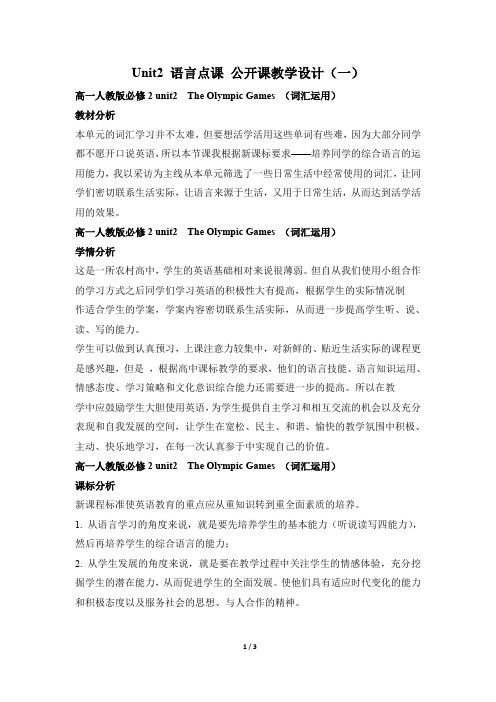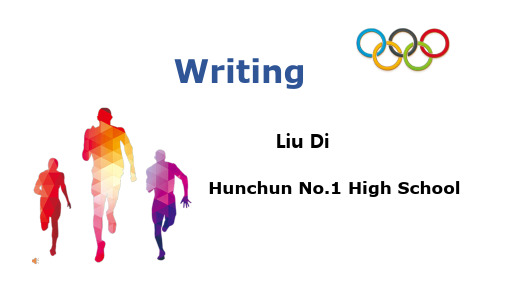高中英语人教新课标必修二Unit2 写作课 教学设计
人教版(2019)高中英语必修第二册教学设计

【原创教学】人教版新教材必修二Unit Two Wildlife ProtectionReading and Thinking一、课例背景1. 文本解读本课例选自人教版高中新教材必修二Unit2 Reading and Thinking —— Wildlife Protection。
本单元的中心话题是目前全世界都相当关注和重视的野生动物的保护。
该主题语境属于三大主题语境“人与自我、人与社会、人与自然”中的“人与自然”这一大类,并从属于该语境下“环境保护”主题群。
该主题语境为语言学习提供了有关人与自然、人与动植物的意义语境,并有机渗透情感、态度和价值观。
众所周知,自然界是一个复杂的生态系统,生存其中的动植物之间存在着微妙的平衡关系。
任何一个物种的灭绝都会对这种平衡产生影响,大规模的物种灭绝会对生态系统产生严重甚至不可逆转的影响,由此会造成巨大的损失。
因此,保护野生动植物和人类可持续发展息息相关,正如文中志愿者扎西所言,保护野生动植物就是保护人类自己,也是保护人类赖以生存的星球。
在处理文本的过程中,笔者用人类和自然两条线贯穿全文,人类线以扎西视角代入我的意识,然后从个体上升到群体,最终上升为整个人类;自然线以藏羚羊为切入点,引出野生动植物,在进一步扩展为自然,最终落脚点为整个星球,然后将两条线索串联在一起,构成了人与自然的和谐统一,即:Zhaxi I We Human beingsHarmonyTibetan antelope wildlife nature planet2. 课型解读本课例所涉及的板块课型是Reading and Thinking,本板块的活动主题是“学习保护濒危动物”,主要讲述了我国保护珍稀野生动物藏羚羊的措施和取得的成就。
阅读文本“A Day in the Clouds”通过介绍藏羚羊过去和现在的生存环境,倡导每个个体通过自身生活方式的改变,学会与自然、野生动植物和睦相处,学会保护、尊重野生动植物,以此来消除人类对野生动植物存在的威胁,最终达成人和自然的和谐共生。
高中英语人教新课标必修二Unit2 语言点课 教学设计

Unit2 语言点课公开课教学设计(一)高一人教版必修2 unit2 The Olympic Games (词汇运用)教材分析本单元的词汇学习并不太难,但要想活学活用这些单词有些难,因为大部分同学都不愿开口说英语,所以本节课我根据新课标要求——培养同学的综合语言的运用能力,我以采访为主线从本单元筛选了一些日常生活中经常使用的词汇,让同学们密切联系生活实际,让语言来源于生活,又用于日常生活,从而达到活学活用的效果。
高一人教版必修2 unit2 The Olympic Games (词汇运用)学情分析这是一所农村高中,学生的英语基础相对来说很薄弱。
但自从我们使用小组合作的学习方式之后同学们学习英语的积极性大有提高,根据学生的实际情况制作适合学生的学案,学案内容密切联系生活实际,从而进一步提高学生听、说、读、写的能力。
学生可以做到认真预习,上课注意力较集中,对新鲜的、贴近生活实际的课程更是感兴趣,但是,根据高中课标教学的要求,他们的语言技能、语言知识运用、情感态度、学习策略和文化意识综合能力还需要进一步的提高。
所以在教学中应鼓励学生大胆使用英语,为学生提供自主学习和相互交流的机会以及充分表现和自我发展的空间,让学生在宽松、民主、和谐、愉快的教学氛围中积极、主动、快乐地学习,在每一次认真参于中实现自己的价值。
高一人教版必修2 unit2 The Olympic Games (词汇运用)课标分析新课程标准使英语教育的重点应从重知识转到重全面素质的培养。
1. 从语言学习的角度来说,就是要先培养学生的基本能力(听说读写四能力),然后再培养学生的综合语言的能力;2. 从学生发展的角度来说,就是要在教学过程中关注学生的情感体验,充分挖掘学生的潜在能力,从而促进学生的全面发展。
使他们具有适应时代变化的能力和积极态度以及服务社会的思想、与人合作的精神。
高一人教版必修2 unit2 The Olympic Games (词汇运用)教学设计Step I:class report (课前演讲)(Topic(今日话题):--The importance of breakfast 早餐的重要性!--Today ,I am an interviewer! 今天我来当记者!通过每次的课前三分钟锻炼学生的英语表达。
新课标高中英语必修二全册教案必修2教案

新课标高中英语必修二全册教案必修2教案介绍本教案是针对新课标高中英语必修二全册的教学内容而设计的。
必修二教案旨在帮助学生更好地理解和掌握相关的英语知识和技能。
通过本教案,学生将能够提高听、说、读、写和翻译等英语技能,同时也能够拓宽他们的英语词汇量和语法知识。
教学目标- 提高学生的听力理解能力,使其能够正确听懂和理解与课本内容相关的英语对话和文章。
- 培养学生的口语表达能力,使其能够用流利和准确的英语进行简单的对话和交流。
- 培养学生的阅读理解能力,使其能够读懂并理解课本中的英语文章和故事。
- 帮助学生提高写作能力,使其能够用英语书写简单的句子、段落和文章。
- 锻炼学生的翻译能力,使其能够将中文翻译成英文和将英文翻译成中文。
教学内容本教案涵盖了必修二全册的所有课程内容,包括但不限于以下主题:- Unit 1: Cultural Relics- Unit 2: The Olympics- Unit 3: Life in the Future- Unit 4: Earthquakes- Unit 5: Nelson Mandela- Unit 6: Life in the Future教学方法为了达到上述教学目标,我们将采用以下教学方法:- 听力训练:通过让学生听录音和对话来提高他们的听力理解能力。
- 口语练:通过角色扮演和对话活动来培养学生的口语表达能力。
- 阅读训练:通过阅读课本中的文章和故事来提高学生的阅读理解能力。
- 写作练:通过写作任务和练来帮助学生提高写作能力。
- 翻译训练:通过翻译练来锻炼学生的翻译能力。
教学评估为了评估学生的研究效果和对教学内容的掌握程度,我们将采用以下评估方式:- 听力测试:通过听力测试来评估学生的听力理解能力。
- 口语表达:通过口语表达任务和对话活动来评估学生的口语表达能力。
- 阅读理解:通过阅读理解任务和测试来评估学生的阅读理解能力。
- 写作评估:通过作文和写作练来评估学生的写作能力。
人教版高一英语必修二Unit2 写作课 公开课课件(共22张PPT)

Liu Di
Hunchun No.1 High School
Fu Yuanhui
Chinese Women Volleyball Team
Heroes
UnVkonoluwnnteHeresroes
Volunteers
What qualities do you think a volunteer should have ?
so that; noBTtoeobsbneidelcygea…isunbs;wueF;tiintahalslloy…;
I'm eager to be a volunteer, _b_e_ca_u_s_e_I want to be part of the Olympics. Besides, I'm _n_o_t_o_n_l_yhelpful____b_u_t_also hard-working,__s_o__th_a_t I am sure I will offer the best service to the athletes in the games.
Firstly, I promise I should try to serve our guests and athletes from all over the world with enthusiasm. Besides, I have a rich knowledge of Chinese history so that I will be not only a servant but also a carrier for our culture. What's more, as we all know, English, which is an international language, will play an important role in communication during Olympics, and I can express myself fluently and clearly in English.
人教版高中英语必修第二册 UNIT 2 写作指导 关于动物保护的海报

【审题谋篇】
体裁 人称 时态 话题
框架
海报 第一人称 一般现在时 保护远东豹
标题。 主体段落:第一层介绍濒危动物名称、现状及其原因;第二层以 引起读者深思来结尾。
【遣词造句】 1.词汇 (1)森林砍伐 deforestation (2)快速地 rapidly (3)处于危险之中 in danger (4)非法捕猎 illegal hunting (5)拯救我们的栖息地 save our habitats
2.句式 (1)要点翻译 ①我们对大自然和人类都很重要。
We are important both to ②我们必须很好地得到保护。
nature and to human beings.
We must be well protected
.
③由于森林砍伐,我们的栖息地正变得越来越小。
Our habitats are becoming smaller and smaller due to deforestation . ④我们的种群现在正快速减少。
4.We shouldn’t pollute water and environment or cut down so many trees. 我们不应该污染水和环境或砍伐这么多的树木。
5.Protecting wild animals is a better choice for human beings! 保护野生动物是人类更好的选择! 6.Love animals,so that human beings are not alone! 爱护动物,让人类不孤单!
【妙笔成篇】 _______________________W__e_a_r_e_i_n_d__a_n_g_e_r_! ________________________ __W__h_e_n_i_t_c_o_m_e_s__to__th_e_A__m_u_r__le_o_p_a_r_d_,a_l_l _o_f_u_s_a_r_e_i_n_d_a_n_g_e_r._W__e_a_r_e_s_o________ _im__p_o_rt_a_n_t_b_o_th__to__n_a_tu_r_e_a_n_d__to__h_u_m_a_n__b_e_in_g_s__th_a_t_w_e__m_u_s_t_b_e__w_e_l_l __________ _p_ro_t_e_c_te_d_.O__u_r_h_a_b_i_ta_t_s _a_re__b_e_c_o_m_i_n_g_s_m_a_l_le_r__an_d__s_m_a_l_le_r_d_u_e__to______________ _d_ef_o_r_e_st_a_ti_o_n_,a_s__a_r_e_su_l_t_o_f_w__h_ic_h__o_u_r _p_o_p_u_la_t_io_n__is__re_d_u_c_i_n_g_r_a_p_id_l_y_n_o_w__.O__u_r __ _n_u_m_b_e_r_s_a_re__le_s_s_t_h_a_n_1_0_0_._In__o_r_d_e_r _to__s_to_p__u_s_f_ro_m__b_e_i_n_g_k_i_ll_e_d_,w__e_h_o_p_e_t_o_____ _h_av_e__e_n_o_u_g_h_l_iv_i_n_g_s_p_a_c_e_s_. __________________________________________ __S_t_o_p_i_ll_e_g_a_l _h_u_n_ti_n_g_a_n_d__s_av_e__o_u_r_h_a_b_it_a_ts__n_o_w_!_________________________ ________________________________________________________________
高中英语人教新课标必修二Unit2 Using Language Reading 教学设计

process and
strategies(过程与方法)
1.learn to study in a group 2.learn the reading strategies as skimming and scanning 3.Practise students' writing, reading, listening and speaking ability
3.Would you ask a God orGoddess for help? Give your reason.
Join in their
discussion.
Discuss and write down their idea. Then share their idea with all the class.
Unit2 Using Language Reading公开课教学设计(一)
必修二第二单元reading2教学设计
基本信息
内容
The Story of Atalanta
课时
第四课时
执教者
哈森图雅
授课班级
高二一A班
所属教材
人教版必修二第二单元
授课时间
第二节课
教学目标
knowledge
and skills
Check the
answers with
students.
Read and listen to the passage
carefully and fill the blanks.
step 4.role play-dialogue
2019人教版高中英语必修二Unit 2 读写课课件
Lead-in
What should be included in a poster?
title
opinions or
appeals poster
description of the situation or problems
pictures / graphs
Features: attractive and concise (简短的)
Don’t make ... with my ...!
Their future is in our hands!
More caring, less hunting!
Save it to cherish, or leave it to perish! Preserve & Protect
Live and let live!
Activity1
While reading Look at the posters below. Which emotions do the photos communicate? How do you feel?
funny surprising frightening sad …
I think it’s a little frightening! It doesn’t look friendly and its teeth look sharp!
image summary
Possible headlines
Give ... a chance! Hug me! Save me!
Give ... peace!
Don’t kill me, please!
Bring ... back!
Give .... a home!
英语人教版高中选择性必修二教案Unit 2 Using Language第2课时
Unit 2 Bridging CulturesUsing language Period 2教材分析本节的阅读语篇选自报纸的专栏讨论,主题是关于出国留学的利弊,内容是两位家长关于此问题的投稿信,他们分别从个人、国家及全球的角度阐述了自己的立场:一位认为出国留学弊大于利,另一位则认为利大于弊。
这两篇文章兼具书信和议论文的体裁特点,此外,两个文本都有效使用了一些衔接词语,使文章更具条理性和逻辑性,以便读者理解作者的推理和论证过程。
通过要求学生阅读并理解作者的观点和论证思路,引导学生客观分析出国留学的利与弊,培养批判性思维,了解议论文的结构和关注语篇的逻辑性,在此基础上完成一篇观点明确、论证严谨的议论文,阐述自己对于出国留学的看法。
教学目标在本课学习结束时,学生能够:1. 梳理议论文的语篇结构和文本逻辑。
2.正确理解和分析文章中衔接词语的表达效果。
3. 理性分析出国留学的利与弊,学会客观、全面、深入地思考和分析问题,并就出国留学的利弊写一篇议论文,有理有据地阐述自己的观点。
教学重难点【教学重点】1. 掌握议论文语篇结构、行文特点和语言特色。
2. 掌握衔接词语的功能,培养正确使用衔接词语的意识和能力。
3. 理解作者的观点和论证思路,客观分析出国留学的利弊,培养批判性思维。
【教学难点】能客观全面地分析出国留学的利弊,根据总结的语篇结构写一篇议论文阐述自己的观点,并在写作中恰当使用衔接词语,增强文章的条理性和逻辑性。
教学过程Step 1 Lead-inThese years, more and more students are choosing to study abroad. Do you think it’s necessary to study abroad? Why or why not?设计意图:导入话题,引导学生讨论近年来的“留学热”问题,并为本课的话题做好铺垫。
Step 2 Reading1.Go through the text and think about the two questions.(1) Where are the two passages from?(2) Who are the writers?设计意图:引导学生留意文本来源,关注文章体裁。
人教课标版高中英语必修2 Unit2_写作课_名师课件(一)
• Ending:
Atanlanta caught up with Hippomenes…
Share the story
• Beginning: There was a princess named Atalanta who… • Development: Hippomenes, a man who also wanted to run the race… • Climax: Atalanta ran faster than Hippomenes and … • Ending: Atanlanta caught up with Hippomenes…
Background
• Where did the ancient Olympic Games start?
In Greece
• Did women play an important role in the games at that time?
No. They were not allowed to take part in the Olympic Games.
Development Climax
Went home sadly
Other competitors:
Stay to run the race
Hippomenes
Before seeing Atalanta After seeing Atalanta
The race
Atlanta Hippomenes
Using the given words
The first two given sentences
Beginning? Development? Climax? Ending? Check the logic and coherence
【范文】人教英语新课标必修2全册精品教案(Unit 2 The Olympic Games)
人教英语新课标必修2全册精品教案(Unit 2 The Olympic Games)课件www.5yPartone:TeachingDesignPeriod1:Alessonplanforr eadingAimsTotalkaboutthehistoryoftheolympicsgamesTo readaninterviewabouttheolympicGamesProceduresI.warm ingupwarmingupbysharingmorning,everyone!Todayweareg oingtolearnaboutTHEoLymPIcGAmES.Butfirst,I’dliketoknowhowmuchyouknowabouttheolympicstobeheldin Beijing.Anythingaboutitisok.oh,LiLei,doyouwantatry?…Right.youknowsomuchabouttheolympics.Toady,we’lllearnmoreaboutitinancientGreece.warmingupbydescri bingNow,boysandgirls.I’llshowyouavideoshowofthe28tholympicGames.Pleasetell mewhatitisaboutanddescribeittotheclass.ok,wangLin,p leasedescribeit.wonderful.That’sLiuXiang.Thehurdleking!warmingupbydiscussingHi,cla ss.youknowourcountryistryingherbesttopreparefortheX XolympicGames.Everyoneisexpectingandexcitedaboutit. Let’sdiscusswhatwecandoforit.Andimaginewhatwewilldoatth eXXolympics.II.Pre-reading1.AskingandansweringNow,p leasereadthethreequestionsbeforetheReading.Let’sdoitinturn.Let’sbeginfromthefirstrowhere…ok,youdidagoodjob.Let’ssummarizeyouranswers.Forreference:1.InSummerolympi cs,therearerunning,swimming,shooting,wrestling,jump ing,football,basketball,volleyball,tabletennis,thro wing,javelin,weightlifting,gymnastics,boxingetc.Inw interolympics,thereareskiingskating,icehockey,skiju mping,sledding,snowboardingetc.2.The29tholympicGame swillbeheldinBeijingonAuguster18th,XX.3.Toholdtheol ympicGamesisarichprizeforacountry.Anditcanmakeacoun tryknownintheworld.Itcanstimulatethecountry’seconomy,andhelptospeedupitsdevelopment.2.Imagingan dintroducingPleaselookatthethreepicturesinthereadin g.Pleasetalkaboutthem.Imaginewhateveryoucan.Forrefe rence:ThefirstpictureisthestatusofagreatGreek.Hisna meisPausanias.Hewasafamoustravelerandwriterinthesec ondcenturyAD.HisGuidetoGreeceisanextremelycomprehen siveguidebookfortourists,concentratingonbuildings,t ombsandstatusandincludingalotofinformationonthemythological,religiousandhistoricalbackgroundtothemonum entsdescribed.Itissoinformativethatitmaybecalledthe foundationofclassicalarchaeologyandthisancientBaede kerisstillusedasaguidetoclassicalGreece.canyouremem berafamousancientchinesetravelerandwriter?Healsowro teabook.yes,hisnameisXuShake.HisworksisTheNotesofXu Shake’stravels.Thesecondpictureistheopeningceremonyoftheo lympicGames.maybethisistheprinciplestadium.It’slargeandcanholdthousandsofaudience.Thethirdpicture isachineseathletenamedyangyang.Shewonagoldmedalforc hinaintheXXwinterolympicGames.Sheisafamousskatingpl ayer.3.TalkingandSharingweknowtherearemanydifferenc esandsimilaritiesabouttheancientandmodernolympics.D oyouknowanythingaboutthem?youcansimplyguess.yes,Luc y,try…III.Reading1.Readingaloudtotherecordingandfindingth egeneralideaNowpleaselistenandreadaloudtotherecordi ngofthetextANINTERVIEw.Payattentiontothepronunciati onandintonationaswellasthepauseswithineachsentence. Thentrytogetthegeneralideaofthepassage.Haveyougotth emainidea?yes,ittellsusthedifferencesandthesimilaritiesbetweentheancientandmodernolympics.2.Readingand actingNowlet’splaythepartsoftheGreekwriterPausaniasandthechinese girlLiLi.Nowboys,youarePausanias;girls,youareLiLi.P leasepayattentiontotheboldwords.3.Readingandfinding Nowreadthetextagain.Theboysshalltrytofinishthetask: whatwastheancientolympicslike?Thegirlsshalltrytofin ishthetask:whatisthemodernolympicslike?4.Readingand collectinginformationok,nowlet’sreaditsilently.Firstlet’stalkaboutthesamepointsbetweentheancientandmodernol ympics.whocananswer?Anyvolunteers?Thenlet’scometothedifferences.Thesimilarities①Bothareheldeveryfouryears.②Bothareheldnotformoneybutforhonour.③Thebeliefsarethesame.Theyare:Swifter,Higher,andstro nger.④menareallowedtotakepartbothinancientandmodernolympi cs.⑤Someeventsarethesame,suchasrunning,jumping,shooting andthowing.TheDifferences①Therewerenotwinterolympicsinthepast.②Nowcompetitorsarefromallovertheworld.Butintheancien ttime,onlythepeopleinGreececouldtakepart.③onlymenwereallowedtotakepartinthepast,nowwomanareal soallowed.④Inthepast,winnersgottheolivewreathastheprize.Nowcom petitorscompeteformedals.⑤Theeventsandathletesinmoderntimearemorethanthoseint hepast.⑥Thereisaspecialvillageforthecompetitorstolivein,ast adiumforcompetitions,agymnasiumforthesewhowatchtheg amesnow.Buttherewerenotinthepast.)5.Readingandunder liningNextyouaretoreadandunderlinealltheusefulexpre ssionsorcollocationsinthepassage.copythemtoyournotebookafterclassashomework.collocationsfromANINTERVIE wtakepartin…,goldmedals,thespiritof…,beheld,inord erto,hosttheolympicGames,onamagicaljourney,findout, thepresentdayolympicGames,usedto,writeabout…,comet oyourtime,beadmittedas…,twosetsof…,enjoycompeting in…,competeagainst…,forthehonourof…,reachthestan dard,beadmittedto…,playaveryimportantrole,aswellas ,astadiumforcompetitions,asamatteroffact,competefor …,olivewreath,feelproudof…,make…happyⅣclosingdownclosingdownbydoingexerciseToendthelesson youaretodothecomprehendingexercises1&2.closingd ownbydiscussingyouknowourgovernmenthastrieditsbestt ocompeteforhostingthe29tholympicGames.Ithascostalot ofmoney.Doyouthinkitisworthwhile?why?Forreference:I tisworthwhiletohosttheolympicGames.TohostolympicGam escanmakeourcountryknowntothewholeworld.Tohostolymp icGamescanmakeourcultureandpeopleunderstoodbytheoth erpeoples.TohostolympicGamescanstimulatethedevelopi ngofoureconomy.closingbyimaginingImaginewhatwewilld oandwhatwecandoforthe29tholympicGamesnow.Forreferen ce:maybewecanserveasvolunteerstohelptheforeignvisit orsandathletesfromallovertheworld.Soatpresentweshouldstudyhard.EspeciallyweshouldtryourbesttolearnEngl ishwell.closingdownbynarratingwecanseethetextiswrit teninaconversationalstyle.Andtherearetwospeakers.on eisPausanias,aGreekwriterXXyearsago,theotherisLiLi, achinesegirl.Nowlet’schangeitintoanarrativestyle.Inotherwords,let’sdescribetheancientandmodernolympicGamesinourownwor ds.whowouldliketohaveatry?Forreference:Theancientol ympicGamesbeganinGreeceandwereheldfrom776B.c.toA.D. 393.Itwasheldeveryfouryears.Atthattime,therewerenot somanysportsastoday.Andwomenwerenotallowedtotakepar tinthegames.Therewerenotwinterolympicsatthattime.wi nnersgottheolivewreathastheprize.Themottowasswifter ,higherandstronger.ThemodernolympicGamesbeganin1891 .They’reheldeveryfouryears.Therearemanynewsportsintheolym pics.Inthesummerolympicsthereareover250differentspo rts.womenarenotonlyallowedtojoininbutalsoplayaveryi mportantrole.Nowthecompetitorscompeteformedals.Them ottoisswifter,higherandstronger.closingdownbysummar izingAswehavefinishedthepassagewe’llsumupwhatwehavelearned.Firstlet’sseethewritingskills.Itiswritteninaconversationalst yle.It’sinaveryinterestingway.ItadoptsadialoguebetweenPaus aniaswholivedXXyearsagoandachinesegirdinmodernworld .Throughtheirdialogue,thedifferencesandsimilarities betweentheancientandmodernolympicGamesaremadeknownt othereaders.justbecauseitisinaconversationalstyle,t herearequiteafeworalspokenEnglishandellipticalphras es.Throughthecomparisonbetweentheancientandmodernol ympicGames,wehavelearnedthedifferencesandthesimilar itiesbetweenthem.Nowwecanhaveadeepunderstandingofth eGames.Fromthepassage,wecanhaveadeepunderstandingof theGames.Fromthepassage,wecanalsogettoknowthattheol ympicGamesaredevelopingandimproving.It’sourdutytomaketheolympicGamesbetterandhealthier.wek nowthatoneoftheslogansforXXBeijingolympicGamesisGre enolympicGames.Itshowsthatpeoplearepayingmoreandmor eattentiontoourenvironment.Period2:AlessonplanforLe arningaboutLanguageAims:TolearnaboutfuturepassivevoiceTodiscoverusefulwords andexpressionsTolearnthemethodsofwordsformationProc eduresI.warmingupwarmingupbydictatingThereareseveralimportantsentencesinthisunit.Let’sdictatethem.Ifyoucan’t,learnthembyheartafterclass.①whenandwherewillthenextolympicGamesbeheld?②Iliveinwhatyoucall“AncientGreece”and/usedtowriteabouttheolympicGamesmorethanXXyearsa go.③Allcountriescantakepartiftheyreachthestandardtobead mittedtothegames.④ThenextolympicGameswillbeheldinmyhometown.⑤Itisjustasmuchacompetitionamongcountriestohosttheol ympicsastowinanolympicmedal.warmingupbydiscoveringu sefulwordsandexpressionsTurntopage11anddoexercises1 ,2,3and5first.checkyouranswersagainstyourclassmates ’.II.Learningaboutwordformation1.Doexercise4anddis covertherules.Turntopage12andfindouttherulesofwordf ormation.Byadding-ingtoaverb,wecanchangetheverbinto anoun.Thatmeanswecanchange“doingsomesport”into “thenameofthesport”.Byadding-ertoaverb,wecanchang etheverbintoanoun.Thatmeanswecanchange“doingsomesport”into “thepersonwhodoesthesport”.2.meansofword-formatio ningeneralAffixation,conversion,andcompositionareth echiefmeansofword-formationinEnglish.Besidesthese,t herearealsootherminorwaysofword-formationincludingc lipping,acronymy,blendingetc.III.LearningaboutPrese ntFuturePassiveVoiceTurntopage13anddoexercise3.Andt elltheclasstheformationofpresentfuturepassivevoice. Forreference:welldone,class.wecanfollowthefollowing formlationtoturnthefuturetensesintofuturepassivevoi ce;begoingtobedone,beabouttobedone,betobedone,will/ shallbedone,would/shouldbedone.Ⅳclosingdownbysummarizing1.Presentfuturepassivevoice AffirmativeNegativeInterrogativeIyouHe/she/itwill beaskedwewillyou/TheywillIyouHe/she/itwillnotbeaskedwewillnotyou/TheywillnotwillIwillyouwillhe/s he/itbeaskedwillwewillyou/they2.ThepassiveVoiceofphrasal verbGenerallyspeaking,onlytransitiveverbscanformthe passivevoice,foronlytransitiveverbscanbefollowedbyobjects.Butmanyintransitiveverbstogetherwithsomeprep ositionsandadverbscanbeusedastransitiveverbs.Sothey canalsobefollowedbytheobjects.Thereforetheycanalsob eusedinpassivevoice.Butnotethatallthephrasalverbsar eusedasawhole.whenusingtheminpassivevoice,wecannotd ropouttheprepositionsandadverbs.Forexamples:Atlastt heyputoutthefire.Atlastthefirewasputout.Theywillputupanoticeonthewal l.Anoticewillbeputuponthewall.Haveyousentforadoctor?Hasthedoctorbeensentfor?Ihaveneverheardofsuchathing before.Suchathinghasneverbeenheardofbefore.wemusttakegoodc areofthechildrenhere.Thechildrenmustbetakengoodcareofhere.Hisclassmatesl aughedathimforthefoolishmistake.Hewaslaughedatforthefoolishmistakebyhisclassmates.P eriod3:AlessonplanforusinglanguageAims:Toreadaboutt heancientolympicGamesTolistenandtalkabouthobbiesTow riteabouthobbiesProcedures1.warmingupwarmingupbyint roducingHi!class.youknowGreeceistheworld-knowncount rywithanancientcivilization.Ithasalonghistorywithso muchmarvelousculture.TheGreekshadwonderfulstoriesab outtheGodsandGoddnesseswhowerepartoftheirreligion.T heybelievedthatthesegodorgoddesseswouldhelphumansif theyfeltsorryforthemorifthehumansweregoodpeople.How ever,theGodsdidnotalwayshelp.Theybehavedlikepeoplew howereunpredictableandcapricious.Totrytogetthesuppo rtoftheGodspeoplehadtopraytothemandofferthempresent .InthisstorytheGoddessHera,thewifeofthechiefGod,Zeu swassorryforHippomenesandagreedtohelphim.warmingupb ysharingNow,boysandgirls.Isthereanybodywhocantellus someGreekmythology.youknowtheyaresofamousinhumanhis tory.orcanyouspeakoutsomenamesofGreekGodsandGoddess es.Prometeus普罗米修斯——asonoftheformerchiefGodSphinx斯芬克斯——abeingwithahumanfacebutalionbodyPandora潘多拉——abeautifulgirlwitheveryillandevilthoughtanddeedZeus宙斯——thechiefGodwhogovernedtheworldHera天后——thewifeofZeuswhogovernedtheloveⅡ.Guidedreading1.ReadingandjudgingReadthetextTHEST oRyoFATLANTA,andcompletetheTrueorFalseguestionsafte rthetextonpage14.2.ReadingandansweringReadthetextag ain,andanswerthefollowingquestions.A.whatwasAtlanta’sproblem?B.whatwereAtlanta’srules?c.whatwasHippomenes’amazement?D.whatmadeHippomeneschangehismind?E.whomd idHippomenesturntoforhelp?F.canyouguesswhatwastheen ding?Forreference:A.Atlantacouldrunfasterthananymen inGreece.ButshewasnotallowedtorunintheolympicGames. B.Shepromisedtobemarriedtoamanwhocouldrunfasterthan her.Ifhecouldnotrunasfastasher,hewouldbekilled.c.Hi pppomenescouldnotunderstandwhysomanyyoungmenwantedt orisktheirlives.D.Atlanta’sbeautymadehimunderstandhisamazementandchangehismin d.E.HeturnedtotheGoddessofloveforhelp.F.Hippomenesw askilledbecauseoflosinghisrace.G.HeranfasterthanAtl antaandmarriedher.3.ReadingandunderliningNextyouare toreadandunderlinealltheusefulexpressionsorcollocat ionsinthepassage.copythemtoyournotebookafterclassashomework.collocationsfromTHESToRyoFATLANAbeallowedt o,runagainst…,willbepardoned,hearof…,beamazed,asf astas…,changeone’smind,ask…forhelpfrom…,promiseto,willberelaxed,pickup,beconf identabout…,shareone’spain,runpast…,competewith…,cheaptomarry4.Listeni ngForlisteningturntopage15andbereadytodoexercises1. Firstreadthequestionscarefullyandimaginewhatistheli steningabout.whendoingexercise2,youmustmakeclearwha tiswrongwiththesentence.Andtelltheclasswhichiscorre ct,whichiswrongandwhichisonlyhalftrue.5.ActingNextw earegoingtoputthetextASToRyoFATLANTAonstage.youknow therearefourcharactorsinthestory.whowouldliketobeth em?whowillbeAlanta’sfather,theoldking?whowillbetheGoddessofLove?ok.LiL i,youaretheGreekprincess.ZhangQiang,youarethebravey oungmanHippomenes.Lucy,youaretheGoddessofLove.ZhouG ang,youaretheprincess’sfather.Therestofclass,pleaseprepareitingroupsoffou r.Thenactyourplaybeforeclass.AtextplayofTHESToRyoFA TIANTATime:onemorninginspringPlace:atthepalacePeopl e:theoldking,theprincess,theyoungman,theGoddessoflove.F:mydeardaughter,youseehowbeautifulthespringis!youare justlikethespringflowers.whydon’tyoumarry?Somanyyoungkingsandprincesswanttomarryyou ,andtheyareallsorich,smartandnice.A:oh,dearfather.IhavepromisedthatIwillonlybemarriedto amanwhocanrunfasterthanme.Iwillrunagainsthim.Ifheca nnotrunasfastasme,hewillbekilled.Noonewillbepardone d.F:But,mydeardaughter.Nomanhaswonyou.Theyallsentthemse lvestodeath.whenwillyougetmarried?A:Iwon’tmarryunlessIamallowedtorunintheolympicGames.H: oh,mykindestkingandmyprettiestprincess!I’llmarrytheprincess.I’llcompetewithyou.A:Doyouknowtherules?H:yes,princess!F:oh,youngman!Goaway!youcan’twinher.youareonlylosingyourlife!H:No,Iwantatry!F:Foolishthing!Goaway!Don’tgotodie!L:oh,youngman,what’sthematter?whyareyousosad?H:oh,myGoddess,canyouhelpme?canyouhelpmetowintheprinc essandmarryher?L:ok,youngman.Doyoureallywanttomarryherandloveher?H: ofcourse.Sheissobeautiful.L:ok,itiseasy.Takethesethreegoldenapples.ThrowapplesinfrontofAtlantawhensheisrunningpastands hewillberelaxed.whenshestopstopickitup,youwillbeabl etorunonandwin.H:oh,thankyou,myGoddess!k:well,youngman,whyareyouhereagain?H:mykindestking.Iwanttomarryherandrunagainsther!k: well,youngman.Irepeat.Don’tbesilly!Goaway!H:No.Iloveher.Iwillmarryher-ordie!6.SpeakingNow,class.Let’scarryoutasurveyoftheinterestsintheclassandwritedownthenamesoftheclassmateswhohavethesameinterests.you cancarryoutthetasklikethis.whichdoyoulike,sport,musicorcollection?whichofthesportsdoyoulikebest?whatisyourfavoritesport?Areyouinterestedintabletennis?Afterthesurvey,theoneswhohavethesameinterestssittog etherandpleaseworkingroupsoffourtotalkabouttheirint erest.whydoyoulikethissport/music/collection?whendo youbegintolikeit?what’senjoyableaboutthehobby?whathaveyoulearnedfromtheho bby?III.Guidedwriting1.writinganimagineddialogueGro ups1and2aregoingtowriteanimagineddialoguebetweenthe princessandHippomenes.youmaybeginlikethis:oh,mydear princess,Iwanttomarryyou…2.writingadescriptionTurntopage16andfollowthedirect iontowriteadescriptionofyourfavoritehobby.Hereisane xample:Swimmingismyfavoritesport.Ilikeitbecauseitca nbringmemuchfun.Theprocessoflearningswimmingisveryi nteresting.youcantrydifferentwaysofswimming,suchasb reaststrokeandbackstroke.youcanswimatanytimeoftheyearifyoulike.Inhotsummer,ifyoujumpintotheriverorthes eatohaveaswim,you’llfeelcoolandcomfortable.Evenincoldwinter,youcanswi mifyouarebraveenough.It’sahealthysportanditcanbuildupyourbody.Ifyouareabegi nner,youmustbecareful.you’llbetternotswimaloneandbringlifebuoywithyouincaseof danger.Ifyouwanttobeagoodswimmer,youmusthavealotofp racticeandhavegreatdetermination.IV.closingdownbyfi ndinginformationGotothelibrarytoreadorgetonlinetose archinordertofindmoreinformationontheolympicGamesan dtheancientGreekmythology.Takenotesofyourfindingand reporttoyourgroupmatesnextmondaymorning.PartTwTeach ingResourcesSection1:ThewritingstyleofthereadingANI NTERVIEwTypeofwritingconversationalstylemainideacom paringthedifferencesbetweenAncientandmodernolympics characteristicsBycomparingandcontrastingSection2:Ba ckgroundinformationontheolympicGamesI.Eventsofthemo denolympicGamesArchery,Baseball,Badminton,Basketbal l,Beach,Volleyball,Boxing,canoe/kayak,cycling,Divin g,Equestrian,Fencing,FieldHockey,Gymnastics,Handbal l,judo,modernPentathlon,Rowing,Sailing,Shooting,Soccer,Softball,Swimming,SynchronizedSwimming,TableTen nis,Tennis,Taekwondo,Track&Field,Triathlon,Voll eyball,waterPolo,weightlifting,wrestlingII.olympicT raditionsTheolympicAnthemTheolympicanthemwaswrittenbytheGreeknationalpoetcos tisPalamasandcomposedbyGreekmusicianSplrosSamaras.I twasfirstsungatthe1896Games.TheIocadopteditastheoff icialolympicanthemtocrownolympicceremoniesatthe1958 IocSessioninTokyo.TheolympicmottoTheolympicmotto“swifter,higher,stronger”comesfromthreeLatinwords”citus,altius,fortius”,whichactuallymean”faster,higher,braver”.TheFrencheducator,BaronRerre decoubertin,whorevivedtheancientolympicGamesandin18 96ledthefirstmodern01ympicGamesinAthens,borrowedthe phrasefromaDominicanpriestHenriDinon.mr.Dinonintrod ucedthesewordswhilepresentingathleticprizesatacolle gein1891.Buthowdidthesewordsbecomethemottooftheolym picGames?ItwasmichelBrealwhointroducedthisphraseatt heclosingdinnerofthecongressforthereestablishmentof themodernolympicGamesonjune23,ter,theInternationalolympiccommitteeformallyadoptedthisphraseasth eofficialmottooftheGames.TheolympiccreedTheolympiccreedwasalsointroducedatthe1896Games.Asst atedbyPierredecoubertin,thecreedisasfollows:”ThemostimportantthingintheolympicGamesisnottowinbut totakepart,justasthemostimportantthinginlifeisnotth etriumphbutthestruggle.Theessentialthingisnottohave conqueredbuttohavefoughtwell.”TheolympicFlagItwasPierredecoubertinwhoconceivedthe ideaoftheolympicflagwithfivecolouredinterlockingrin gsonawhitebackround.Theringsrepresenttheunionofthef ivecontinentsandthemeetingoftheathletesfromallaroun dtheworldattheolympicGames.Today,almostacenturyaftertheflag’screation,thesixcolours,thoseoftheringsandthatofthe whitebackgroundwhichstandsforpeace,stillmaintainthe irsymbolismandcanbefoundinflagsacrosstheworld.Theol ympicflagwasfirstusedduringtheAntwerpGamesin1920.Th eolympicoath“Inthenameofallthecompetitors,IpromisethatweshalltakepartintheseolympicGames,respectingandabidingbyth eruleswhichgovernthem,inthetruespiritofsportsmanshi p,forthegloryofsportandthehonourofourteams.”AttheopeningceremonyofeachGames,oneathletefromtheho stcountrytakesolympicoathonbehalfofallcompetingathl etes.Thisparticulargestureofsports-manshipwasintrod ucedatthe1920GamesinAntwerp,Belgium.Acoachorteamoff icialtakesasimilaroathateachopeningceremony.Theolym picFlameTheolympicflameisoneofthemostvisiblesymbols ofthemodernGames.ItstraditionhassurvivedfromtheGame sofancientGreece,whereasacredflame,ignitedbythesun, burnedcontinuallyonthealtarofthegoddessHera.Themode rnolympicflamewasfirstlitin1928attheAmsterdamolympi cGames,whereitburnedthroughoutthecompetitions.Ithas becomeamajorsymbolforsolidarityamongnationsandembod iestheolympicspiritencompassingtheidealsofpurity,th eendeavourforperfection,thestruggleforvictory,frien dshipandpeace.TheTorchRelayDuringthe1896GamesinAthe ns,younginspiredsportsmenhadorganisedthefirsttorchr elays.However,thetraditionoftheolympictorchofficial lybeganattheBerlinGamesin1936.Asinancienttimes,thetorchislitbythesuninAncientolympia,thenpassedfromrun nertorunnerinarelaytothehostcity,whereitisusedtolig httheolympicStadium’sflameduringtheGames’openingceremony.Theflamethenburnsuntilitisextinguis hedattheclosingceremony.Section3:wordsandexpression sfromunit2THEoLymPIcGAmEShonestadj..notdisposedtocheatordefraud;notdeceptiveorfrau dulent:honestlawyers2.markedbytruth:givehonestanswe rs3.withoutpretensions:workedatanhonesttrade4.without dissimulation;frank:myhonestopinion5.habituallyspea kingthetruth:anhonestman6.worthyofbeingdependedon:anhonestworkingstaff7.freefromguile:Hisanswerwassimpleandhonestancienta dj..veryold:anancientmariner2.inoroftimeslongaganc ientRomeandGreece3.havingexistedsinceaveryearlytime :ancienthistory/customscompetev.totrytowinsth.incompetitionwithsomeoneelse:johncompetedforaplaceattheirschool,butdidn’tgetit.competeforsomething;engageinacontest;measureoneself againstothersmedaln.anawardforwinningachampionshiporcommemoratingsomeot hereventhostn.amanwhoreceivesguests:Heactedashostto hisfather’sfriends.chinaisthehostcountryforXXolympicGames.v.bethehostoforfor:wehosted4coupleslastnight.magicala dj.possessingorusingorcharacteristicoforappropriatetos upernaturalpowers:amagicalspellinterviewn..thequestioningofaperson;oftenconductedbyjourna lists:myinterviewswithteen-agersrevealedaweakeningo freligiousbonds.2.aconferencev..conductaninterviewintelevision,newspaper,andra dioreporting2.discussformallywithforthepurposeofane valuation:weinterviewedthejobcandidates.3.goforanin terviewinthehopeofbeinghired:Thejobcandidateinterviewedeverywhere.athleten.apersontrainedtocompeteinsportsadmitv..allowparticipationinortherighttobepartof;permi ttoexercisetherights,functions,andresponsibilitieso f:admitsomeonetotheprofession2.allowtoenter;grantentrytwecannotadmitnon-membersint oourclub.3.serveasameansofentrance:Thisticketwillad mitoneadulttotheshow.4.giveaccessorentrancetTheFren chdoorsadmitontotheyard.5.affordpossibilitye:Thispr oblemadmitsofnosolution.6.declaretobetrueoradmitthe existenceorrealityortruthof:Headmittedhiserrors.7.a dmitintoagrouporcommunity:we’llhavetovoteonwhetherornottoadmitanewmember.8.haver oomfor;holdwithoutcrowding:Thetheateradmits300peopl e.replacev..putsomethingbackwhereitbelongs:Replacethebooko ntheshelfafteryouhavefinishedreadingit.2.substitute apersonorthingfor:Hereplacedtheoldrazorblade.3.putintheplaceofanother;switchseeminglyequivalenti tems:TheconartistreplacedtheoriginalwithafakeRembrandt.4.taketheplaceormoveintothepositionof:Smithrepl acedmillerascEoaftermillerleft.relatev..haveorestablisharelationshiptSherelateswelltoh erpeers.2.beinarelationshipwith:Howarethesetwoobser vationsrelated?3.giveanaccountof:Thewitnessrelatedt heevents.4.havetodowithorberelevantto5.makealogicalorcausalconnection:Icannotrelatethese eventsatall.sailn..alargepieceoffabricbymeansofwhichwindisusedtop ropelasailingvessel2.anoceantriptakenforpleasure v..traverseortravelbyshipon:wesailedtheAtlantic2. travelinaboatpropelledbywind:Ilovesailing,especiall yontheopensea.3.travelbyboatonaboatpropelledbywindo rbyothermeans:TheQE2willsailtoSouthamptontomorrow.4 .movewithsweeping,effortless,glidingmotions:Shredso fpapersailedthroughtheair.advertisev..callattentiontPleasedon’tadvertisethefactthathehasAIDS.2.makepublicityfor;t rytosellpromisen..groundsforfeelinghopefulaboutthefuture:Thereislittleornopromisethathewillrecover.2.averbalcommitm entbyonepersontoanotheragreeingtodosomethinginthefu turev..givegroundsforexpectations:Theresultspromisedf ameandglory.2.makeapromiseorcommitment3.promisetoun dertakeorgive:Ipromiseyoumybesteffort.4.makeapredic tionabout;tellinadvance课件www.5y。
- 1、下载文档前请自行甄别文档内容的完整性,平台不提供额外的编辑、内容补充、找答案等附加服务。
- 2、"仅部分预览"的文档,不可在线预览部分如存在完整性等问题,可反馈申请退款(可完整预览的文档不适用该条件!)。
- 3、如文档侵犯您的权益,请联系客服反馈,我们会尽快为您处理(人工客服工作时间:9:00-18:30)。
1 / 5 Unit2 写作课 公开课教学设计 写作课教学设计A Letter of Application
一、教学分析与整体设计思路 (一)教学内容分析 本课教学内容为A Letter of Application,课型是写作课。本节课主题为人教版高一英语模块2第二单元Olympics的进一步拓展,结合学生对2016里约奥运会的热情和了解,引发同学们对参与奥运会并做奥运会志愿者的渴望,进一步结合2022年中国主办亚运会的材料,引起学生们学习书写志愿者申请信的兴趣和动力。 (二)学情分析 本节课的教学对象为普通高中高一平行班学生,处于初高中英语学习衔接阶段,由于初高中英语教学目标的不同和学生词汇量方面的断层,造成了学生对高一英语学习信心不足,倍感压力。在这种情况下,学生对写作课有一定的畏难情绪,这也对教师教学方法的选择、教学难度的设定提出了更高的要求。 (三)设计思路 本节课的教学设计主要从范文归纳、过渡语连接词的使用、词句的修改润色和学生思维生成几个方面着手。 1.范文归纳 既然学生对英文申请信的书写无从下手,那么教师为学生提供范文,并引导学生从申请信的结构、过渡语、连接词和词句方面进行梳理就显得尤为必要。这种梳理为学生的写作提供了框架和依托,使学生在写作时能有的放矢,想的清楚结构,写的清楚条理。本节课我采用了一封志愿者申请信范文,并以学生观察、老师提问引导、学生总结、老师补充的方式,使学生对申请信的书写结构、段落布局都有了一个清楚的认识。 2.过渡语连接词的使用 对于在写作中能有条理地表达要点,使用过渡语和连接词是十分必要的。尽管过渡语和连接词的学习并不难掌握,但实际写作中的正确合理应用对学生来说是有难度的,是需要训练的。同时,过渡语和连接词的应用是英语应用文写作中的基石,需要学生在写作中有意识地合理应用。本节课,我通过范文示范、学生讨论 2 / 5
和教师补充等方式达到让学生对过渡语和连接词心中有数的目的,并在接下来的写作、修改和润色中对此作用进行强化。 3.词句的修改润色 在申请信基本框架掌握的前提下,教会学生对作文内容进行润色是十分必要的。翻译上有一个标准叫做“信、达、雅”,这个标准运用在申请信的写作上也是可以的。将要点表述清楚为“信”,对写作目的表达确切为“达”,在写作内容上流畅为“雅”,“雅”文可以使人心情愉悦、印象深刻,这也是申请信书写的一个目标。本节课,我通过引导学生观察、练习、修改等方式,试图提高学生应用好词好句的意识,提高学生修改完善写作内容的能力。 4.学生思维生成 学生需要在语言的使用中体验语言的功能和情感。在本节课的写作中,学生通过观察总结、独立写作、合作修改互评、共同分享、全班展示等多种方式,进行了语言体验、交流和改进,使学生认识到通过合作学习、有针对性的修改和实际的应用,写作并不是难题,而是充满乐趣、挑战和进步的积极体验,从而增强了写作的自信心。 二、教学目标 第一,学生通过观察总结,掌握写作中如何利用过渡语和连接词有条理地组织段落,达到要点表述清楚的目的;第二,通过修改和润色,使学生学会有意识地对写作内容进行加工,达到语言表达顺畅的目的;第三,通过学生互评、分享等方式,使学生学会合作修改、互相促进,增强对写作的积极体验; 三、教学过程 Step1: Lead-in: Talk about 2016 Olympic Games and volunteers’ qualities to stimulate students’ interest Q1:Talk about the well-known athletes who won gold medals in Rio Olympic Games in 2016 to arouse students’ interest of doing something meaningful for Olympic Games. Q2: What qualities do you think a volunteer should have ? Through this step ,students get to know what a volunteer should be like and become interested in being a volunteer and eager to write a letter of application. 3 / 5
【设计说明】 本环节主要是教师通过引导学生谈论2016里约奥运会,激发同学们对奥运会的热情和参与奥运会的渴望,增强本课写作主题的代入感。同时,通过谈论奥运会志愿者应该具备的品质和能力,引发同学们对做奥运会志愿者这一问题的思考,为接下来的书写奥运会志愿者申请信做铺垫。 Step2: Sum-up: Students are presented with an example of an application letter including markers, connectors and sentence patterns. Q1:How many paragraphs are there in this letter? Q2:How is the letter organized? After this step ,students can realize it is necessary to use markers and connectors to organize a paragraph to make it clear and readable .Meanwhile ,markers and connectors are summarized as much as possible . 【设计说明】 本环节提供了志愿者申请信范文,使学生清楚地了解申请信的结构,以及如何通过过渡语和连接词来有效地组织段落,增强学生清楚有条理写作的意识。本环节主要通过学生阅读、观察、讨论、总结来达成教学目标。 Step3: Practice: 1.Practise the usage of markers and connectors Through some exercises, students are able to use markers correctly. 2.Write the body part of the letter with proper markers, connectors and sentence patterns. Lead students to use markers and connectors correctly in their letters and make them more readable and flexible. 【设计说明】 在上一环节总结了过渡语和连接词的基础上,本环节结合2022年中国将主办亚运会的材料,训练学生进行写作,要求合理地应用过渡语和连接词使段落层次分明,要点清楚,达到学以致用的目的,完成本节课教学目标中的教学重点。 Step4: Evaluation: 1.Teacher’s evaluation for a piece of writing 4 / 5
Teacher leads students to evaluate a piece of student’s work and helps students master how to make a judgment on their own work. 2.Pair evaluating: Evaluate deskmates’ work by underlining and correcting mistakes. It is necessary that students can evaluate their own work and try to correct it by evaluating. 【设计说明】 在初步完成申请信的基础上,教师引领学生对作文进行评价,分别从过渡语和连接词的合理使用,语法和词汇,书写的工整性等方面着手,使学生通过评价和互评认识到作文中出现的问题,并有针对性地进行修改。 Step5: Polishing: 1.Practise combining sentences and polishing words Through some exercises ,students are able to combine simple sentences together for a main purpose and make the sentences more flexible. 2.Individual work: Edit and polish your work with sparkling words and sentence patterns Students are given enough time to finish their own work and make an organized paragraph by using markers ,connectors and sentence patterns. 3.Class work: Sharing your favorite sentences By sharing ,students are able to master more good sentences 【设计说明】 在段落层次清楚,要点准确齐全的基础上,本环节力图使学生的写作水准有一个初步的提升,至少要使学生能有意识地增强好词好句的应用,提高写作语言的丰富性和可读性,增强段落语言表达的灵活性。本环节主要通过连词使用练习、学生个人修改润色和集体分享好词好句来实现,教师通过引导、评价和提供建议来引导学生突破本节课的难点。 Step 6: Sharing: Who is the most hopeful volunteer in our class? Two students come to the front and read their letters for all the students and all the
